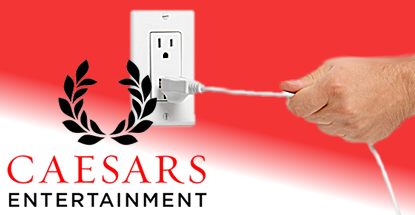 Casino operator Caesars Entertainment isn’t scheduled to release its second quarter earnings report until next week, but expectations are mounting that the release will be accompanied by an announcement of the company’s long awaited financial restructuring. Earlier this week, Fitch Ratings analyst Alex Bumazhny suggested a restructuring was “imminent” and that Caesars would attempt a debt-for-equity exchange with some of its junior creditors.
Casino operator Caesars Entertainment isn’t scheduled to release its second quarter earnings report until next week, but expectations are mounting that the release will be accompanied by an announcement of the company’s long awaited financial restructuring. Earlier this week, Fitch Ratings analyst Alex Bumazhny suggested a restructuring was “imminent” and that Caesars would attempt a debt-for-equity exchange with some of its junior creditors.
Bloomberg reported that Caesars had initiated talks last week with select bond-holders to resolve questions over $12.7b of Caesars $24b total debt. In an indication of how eager Caesars is to resolve these issues, it has reportedly agreed to pay the legal fees of a group of the most preferred creditors currently going over Caesars’ books. Bumazhny expects these holders of first-lien bonds worth $6.35b will emerge relatively unscathed but holders of some $5.2m in second-lien securities may not be so fortunate, recouping 20¢ on the dollar or perhaps nothing at all.
Not surprisingly, Caesars’ moves have generated a flurry of lawsuits. On Tuesday, creditor representatives Wilmington Savings Fund Society filed suit in Delaware, charging Caesars with illegal asset shifting in order to protect its more profitable assets from creditors. Other creditors filed similar lawsuits to undo these asset transfers earlier this year, although efforts to block Caesars raising a further $1.75b in debt to fund the deals were recently thwarted by Illinois gaming regulators.
The claims stem from Caesars’ ongoing efforts to move profitable operations away from Caesars Entertainment Operating Co (CEOC), the division that holds most of Caesars’ long-term debt. These profitable slices – which include select brick-and-mortar casinos and the real-money online gambling and social casino gaming operations of Caesars Interactive Entertainment (CIE) – have been shifted to Caesars Growth Partners (CGP), in which Caesars holds a majority stake. In May, Caesars announced it had sold 5% of CEOC to undisclosed outside investors, a gambit that Caesars claimed had freed it from any obligation to fully honor IOUs held by CEOC creditors.
THE EMPEROR STRIKES BACK
Not to be outdone, Caesars has filed suit in New York, charging certain hedge funds – including affiliates of Appaloosa Management, Centerbridge Partners, distressed debt specialists Oaktree Capital Management and current Argentina default villains Elliott Management – with making “unfounded threats and bogus allegations” regarding the company’s ‘walking dead’ status. The lawsuit seeks a declaration that Caesars is not in default of its debt obligations.
In a statement accompanying the lawsuit, Caesars CEO Gary Loveman said the company refused to be “held hostage by speculators who appear to be betting against the long-term health of our enterprise.” Elliott was singled out for having “the greatest ulterior motive” in seeing CEOC fall, as Elliott has taken out significant credit default swaps (CDS) on CEOC.
Caesars claims Elliott’s CEOC holdings are dwarfed by the amount of its CDS, effectively meaning Elliott believes CEOC is worth more dead than alive. The lawsuit points out that Elliott representatives sit on the industry committee tasked with determining whether or not Caesars’ actions mean the company has entered default.
